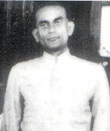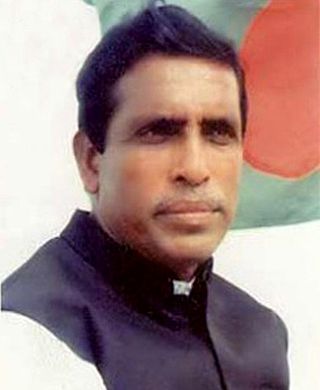Election results
Jatiya Sangsad elections
| Election | Party leader | Votes | % | Seats | +/– | Position | Government |
|---|---|---|---|---|---|---|---|
| 1986 | Mohiuddin Ahmed | 191,107 | 0.67% | 3 / 300 | Opposition | ||
| 1988 | Boycotted | 0 / 300 | — | Extra-parliamentary | |||
| 1991 | 616,014 | 1.81% | 5 / 300 | Opposition | |||
Bangladesh Krishak Sramik Awami League বাংলাদেশ কৃষক শ্রমিক আওয়ামী লীগ | |
|---|---|
| Abbreviation | BAKSAL |
| President | Mohiuddin Ahmed |
| General Secretary | Abdur Razzaq |
| Founder | Abdur Razzaq |
| Founded | 22 October 1983 |
| Dissolved | 15 August 1991 |
| Split from | AL |
| Merged into | AL |
| Headquarters | Dhaka |
| Ideology | Mujibism Bangladeshi nationalism Second Revolution |
| National affiliation | 8-party alliance |
The Bangladesh Krishak Sramik Awami League was a political party established in 1983 by expelled members of the Bangladesh Awami League. [1] Abdur Razzaq was the founder of this party. [2] In the 2022 meeting of the Central Executive Parliament of Bangladesh Awami League, politicians admitted that after the creation of the BAKSAL, the party faced loss. [3]
There was a party under the same name. Bangladesh Krishak Sramik Awami League (BAKSAL), was a political front comprising the Bangladesh Awami League, the Communist Party of Bangladesh, the National Awami Party (Muzaffar) and Bangladesh Jatiya League. [4] Following the Fourth Amendment to the Constitution of Bangladesh, enacted on 25 January 1975, Sheikh Mujibur Rahman formed BaKSAL on 24 February. [5] A presidential order also outlawed all political parties other than BaKSAL, creating a state of emergency and obligating other parties to join the front. The party advocated for democratic socialism as a part of reforms under the theory of the Second Revolution, which BaKSAL worked to achieve the objectives of. [6] Although BaKSAL was put into effect during September 1975, the Assassination of Sheikh Mujibur Rahman and most of his family members eventually led to the party's dissolution. [7] As a result, all the political parties that merged with BAKSAL became independent again.[ citation needed ]
On 25 March 1983, Hussain Muhammad Ershad, the then chief military administrator of the country, said that political activities would be allowed from 1 April 1983. In June 1983, accusations were made against Abdur Razzaq in an Awami League party meeting at residence of Sheikh Mujibur Rahman. On 2 August 1983 Abdur Razzaq and Mohiuddin Ahmed were expelled from the party with additional four members. On 22 October 1983, they created new political party under the name Bangladesh Krishak Sramik Awami League. Mohiuddin Ahmed became president and Abdur Razzaq became general secretary of the newly-founded party. [1] Awami League politician Abu Sayeed also joined the party. [8] It was affiliated to 8-party alliance that time. [9] The party participated in the 1986 and 1991 general elections; in 1986, the party's symbol was a boat, while it was a bicycle in 1991. [10] On 14 August 1991, the party decided to be merged into Bangladesh Awami League and the next day, when Mourning National Day was celebrated by Awami League, all of BAKSAL members joined the party. [11]
After the party was merged into Awami League, there were several attempts to revive it by a group of its former members. There was an attempt to get registration of a political party under the same name before 2008 Bangladeshi general election. In 2014, Kazi Mohammad Zahirul Qayyum, a self-claimed supporter of Mujibism, applied for registration of a political party under the name BAKSAL claiming himself as its secretary general. [12] In 2015, it became affiliated to Bangladesh National Alliance formed by Nazmul Huda. [13]
| Election | Party leader | Votes | % | Seats | +/– | Position | Government |
|---|---|---|---|---|---|---|---|
| 1986 | Mohiuddin Ahmed | 191,107 | 0.67% | 3 / 300 | Opposition | ||
| 1988 | Boycotted | 0 / 300 | — | Extra-parliamentary | |||
| 1991 | 616,014 | 1.81% | 5 / 300 | Opposition | |||
Syed Nazrul Islam was a Bangladeshi politician and a senior leader of the Awami League. During the Bangladesh Liberation War, he was declared as the Vice President of Bangladesh by the Provisional Government. He served as the Acting President in the absence of Sheikh Mujibur Rahman.

Khondaker Mostaq Ahmad was a Bangladeshi politician. He was the Minister of Commerce in the third Mujib Rahman ministry under Sheikh Mujibur Rahman, and assumed the presidency of Bangladesh after the assassination of Sheikh Mujibur Rahman on August 15, 1975. He praised the assassins as "sons of the sun" and put cabinet ministers loyal to Sheikh Mujibur Rahman in jail. He was himself deposed by another coup less than three months later on November 3, 1975.

Abdul Kader Siddique is a Bangladeshi politician. He served as a Mukti Bahini member and organizer of the Bangladesh Liberation War. He fought with an estimated 17,000-strong guerrilla force in the Tangail region against the Pakistan Army. The army was called Kaderia Bahini. At the end of the war in 1971, Siddique's forces entered Dhaka along with the Indian forces, signaling the end of the war. He was awarded Bir Uttom by the Government of Bangladesh. Since 1999, he has been serving as the leader of his newly formed party, the Krishak Sramik Janata League.
The Bangladesh Krishak Sramik Awami League was a political front comprising the Bangladesh Awami League, the Communist Party of Bangladesh, the National Awami Party (Muzaffar) and Bangladesh Jatiya League.

Sheikh Mujibur Rahman, the first president of Bangladesh, was assassinated along with most of his family members during the early hours of 15 August 1975 by a group of Bangladesh Army personnel who invaded his residence as part of a coup d'état. The Minister of Commerce, Khondaker Mostaq Ahmad, immediately took control and proclaimed himself head of an interim government from 15 August to 6 November 1975; he was in turn succeeded by Chief Justice Abu Sayem. The assassination marked the first direct military intervention in Bangladesh's civilian administration. Lawrence Lifschultz characterized this incident as an outcome of the Cold War between the United States-influenced Pakistan and the Soviet Union-influenced India. 15 August is annually observed as and celebrated as a day that ended Sheikh Mujib's presidency, a commemorative day in Bangladesh.

Muhammad Mansur Ali was a Bangladeshi politician who was a close confidant of Sheikh Mujibur Rahman, the founding leader of Bangladesh. A senior leader of the Awami League, Mansur also served as the Prime Minister of Bangladesh in 1975.
Jail Killing Day is observed by the Awami League (AL) of Bangladesh and many other political organisations on 3 November every year. It commemorates the killing of four Awami League and national leaders: former vice-president Syed Nazrul Islam, former prime minister Tajuddin Ahmed and Captain (Rtd.) Mansur Ali, and former home minister A H M Quamruzzaman on this date in 1975.
Sheikh Fazlul Haque Moni was a Bangladeshi politician. He was one of the nephews of Sheikh Mujibur Rahman, the founding father of Bangladesh. He was the founder of Mujib Bahini Bangladesh Liberation Force-BLF one of the major guerrilla forces of the Bangladesh Liberation War and also the founder of Bangladesh Awami Jubo League, the youth wing of Bangladesh Awami League.
The Krishak Sramik Party was a major anti-feudal political party in the British Indian province of Bengal and later in the Dominion of Pakistan's East Bengal and East Pakistan provinces. It was founded in 1929 as the Nikhil Banga Praja Samiti to represent the interests of tenant farmers in Bengal's landed gentry estates. Sir Abdur Rahim was its first leader. A. K. Fazlul Huq was elected leader in 1935 when the former was appointed as the president of the Central Legislative Assembly of India. In 1936, it took the name of Krishak Praja Party and contested the 1937 election. The party formed the first government in the Bengal Legislative Assembly. After the partition of British India, it was reorganized as the Krishak Sramik Party to contest the 1954 election, as part of the United Front. The coalition won the election and formed the provincial government in the East Bengal Legislative Assembly.

Abdur Razzaq was a Bangladeshi politician and member of the Awami League Advisory Council. He was the Minister for Water Resources from 1996 to 2001 in the first Sheikh Hasina Cabinet. He was the chairman of the Parliamentary Standing Committee for the Water Resources Ministry.

The 1969 East Pakistan uprising was a democratic political uprising in East Pakistan. It was led by the students backed by various political parties such as the Awami League and National Awami Party and specially their student wings against Muhammad Ayub Khan, the president of Pakistan in protest of the military rule, political repressions, Agartala Conspiracy Case and the incarceration of Sheikh Mujibur Rahman and other Bengali nationalists.
Hajee Mohammad Danesh was a Bangladeshi politician and communist activist born in the British India.
The Jatiya Ganamukti Union was a Bangladeshi political party created in 1973 by veteran communist leader Haji Mohammad Danesh, who had been a major activist in the Tebhaga movement. It was merged by Danesh into the ruling Bangladesh Krishak Sramik Awami League (BAKSAL) in 1975, after the government of president Sheikh Mujibur Rahman outlawed all other parties. After the downfall of the Mujib regime, the JGU was revived by Danesh until 1980, when he left it to form the Ganatantrik Party.

The Vice-President of Bangladesh was formerly the second highest constitutional office in Bangladesh when the country was governed under a presidential system. The vice-president was the first person in the presidential line of succession, in the event of a president's resignation, removal or death. The post was held by several Bangladeshi statesmen during different periods of the country's history. The inaugural office holder was Syed Nazrul Islam during the Liberation War and the final office holder was Moudud Ahmed before and during '90's Mass Uprising. Abdus Sattar was the only vice-president to succeed to the presidency in 1981.
Nizam Mohammad Serajul Alam Khan, commonly known as Serajul Alam Khan, also called as Dada, Dadabhai and by his initials SAK, was a Bangladeshi politician, political analyst, philosopher and writer who spearheaded the Bangladesh liberation movement under the leadership of Sheikh Mujibur Rahman but also became one of the controlling forces of political polarization in post-independence Bangladesh.
Second Revolution was a political hypothesis presented by the "founding father" of Bangladesh, Sheikh Mujibur Rahman. The hypothesis included a series of reforms in the three pillars of a state: administrative, judiciary and legislative systems. The reforms were enacted through the fourth amendment to the constitution of Bangladesh. BaKSAL was formed as the decision making council to carry out the revolution.
Syed Altaf Hossain was a Bangladeshi politician who was a member of Parliament and Minister of Railway.

The Bangladesh Krishak League was established onn 19 April 1972, at the behest of Bangabandhu, eminent lawyer Sirajul Islam Khan was appointed as the convener of the constitution-making committee and founding vice-president of the Krishka League Central Committee. Krishka League is closely associated with Bangladesh Awami League and is working as one of its affiliated organizations. Samir Chanda is currently the chairman of the Krishak League and Umme Kulsum is the general secretary.
Khandakar Muhammad Illyas (1923–1995) was a writer, left-wing politician, and supporter of ties between Bangladesh and the Soviet Union.